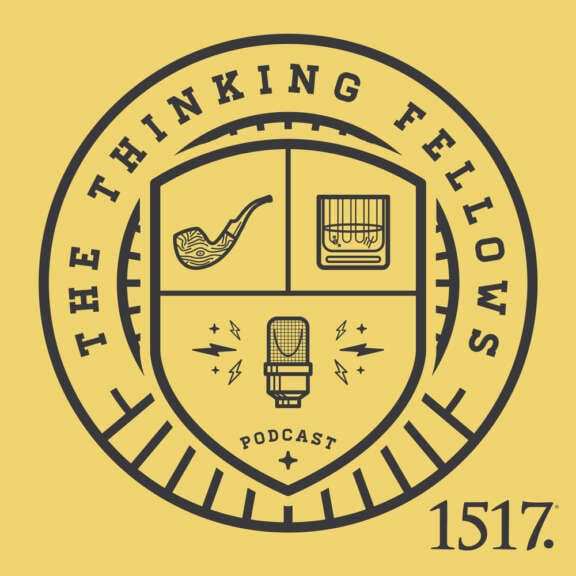Yeah, well, you know, that’s just, like, your opinion, man! Gillespie and Riley continue to read and discuss Erasmus’ diatribe on Free Will and Salvation. How does Erasmus read the Bible and how does his interpretation continue to influence the church today? How does Erasmus’ anthropology determine how the church continues to preach and teach Christian doctrine?
Podcasts
Each 1517 Podcast is dedicated to delivering Christ-centered content through weekly, monthly, and seasonal audio platforms. Listen online or on your favorite podcasting app.
Author
- All Authors
- Aaron Zimmerman
- Adam Francisco
- Amy Mantravadi
- Blake Flattley
- Bob Hiller
- Bradley Gray
- Brian W. Thomas
- Bror Erickson
- Bruce Hillman
- Caleb Keith
- Chad Bird
- Chris Rosebrough
- Christopher Gillespie
- Cindy Koch
- Craig Donofrio
- Dan van Voorhis
- Daniel Deen
- Daniel Emery Price
- Darrin Sheek
- David Andersen
- David Rufner
- David Zahl
- Debi Winrich
- Delwyn Campbell
- Donavon Riley
- Doug Klembara
- Edward Killian
- Elyse Fitzpatrick
- Erick Sorensen
- Flame
- Grant Klembara
- Gretchen Ronnevik
- Haroldo Camacho
- Jacob Smith
- Jared C. Wilson
- Jeff Mallinson
- Jeffrey Pulse
- Jessica Thompson
- Jim Nestingen
- Joel Fitzpatrick
- Joel Hess
- John Andrew Schreiner
- John Bombaro
- John T. Pless
- John W. Hoyum
- John Warwick Montgomery
- Katie Koplin
- Kelsi Klembara
- Ken Sundet Jones
- Magnus Persson
- Matt Popovits
- Michael Berg
- Michael Horton
- Nick Lannon
- Paul Koch
- Peter Nafzger
- Philip Bartelt
- Raleigh Sadler
- RJ Grunewald
- Robert Kolb
- Rod Rosenbladt
- Ron Hodel
- Sam Leanza Ortiz
- Sarah Condon
- Sarah Crowder
- Scott Davis
- Scott Keith
- Steven Paulson
- Tanner Olson
- Troy Neujahr
- Uwe Siemon-Netto
- Wade Johnston
- William Cwirla
-
Hey, careful, man, there’s a theologian here! Gillespie and Riley read and discuss Erasmus of Rotterdam’s discourse on The Freedom of The Will. In his debate with Martin Luther, how did Erasmus lose the battle but win the war over the doctrine of free will? How does it continue to influence the church today?
-
You’re not making Christianity better; you’re making Stoicism worse. Gillespie and Riley continue their discussion of free will and predestination by reading Clement of Alexandria. Where does the doctrine of free will originate? What happens when a Christian blends biblical theology and philosophy? Why doesn’t Riley like Star Wars sermons?
-
I thought we had something, but then you do and pull this. Gillespie and Riley read and discuss Iranaeus on free will and predestination. What part do Christians play in their salvation? Do we choose to sin? Who goes to hell?
-
Just Think of This As a Friendly Test That Could Get You Thrown into Hell, Or Not... Your Choice. Why do we demand that the choice be ours as regards our salvation or damnation? How does the doctrine of free will result in us hating God and each other? What about the influence of free will and predestination on popular culture?
-
The Only Wrong Choice Is to Not Make a Choice... Where does the belief in free will originate? Is free will a biblical doctrine? How does Justin’s teaching on free will and salvation still influence the church and western culture today?
-
What is a "Parable" and why does Jesus seem to speak in such mysteries? Your hosts Pastor Troy Neujahr and Pastor Craig Donofrio explain this Jesus way of communicating to you and for you.
-
Living sacrifices are holy and acceptable to God: What’s that look like? Redeemed and made new by Christ, we use the gifts God has given us to serve others and serve Him.
-
How can we know the mysterious workings of God? We look to Jesus: Jesus does His job of Jesus-ing only the way He can Jesus. Jesus never did His Messiah work the way that people thought that He should, and nothing has changed. We are blessed that He is not a God created of our own image and imagination. All of this is revealed to us through the God’s word alone, and in that word we have comfort of what Christ has done for us.
-
How do you know you are truly repentant? Does your life have to be wrecked by some special sin before you know the Gospel?
-
Craig and Troy wrestle with the same issue Paul is wrestling through: Wanting our friends and family to be saved and knowing that salvation must come through Christ. As the Prodigal Son believed in his father’s goodness and returned, so too will God restore and graft in all who believe—both Jew and Gentile alike—in His Son Jesus Christ.
-
The gospel is not an if-then proposition for us to achieve by works, but a done-deal completion by Christ alone which we receive by faith. Even as a good tree bears good fruit, a living faith does living things: it confesses, believes and trusts in Christ above all things. Today, Craig and Troy dive into all of these issues and more on "For You Radio."


